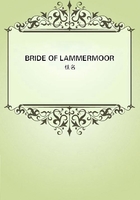
第39章
The old man shook his silvery and thin locks, and looked with an expression of the most heartfelt anguish at his master as he weighed in his hand the slender treasure, and said in a sorrowful voice, "And is this a' that's left?""All that is left at present," said the Master, affecting more cheerfulness than perhaps he really felt, "is just the green purse and the wee pickle gowd, as the old song says; but we shall do better one day, Caleb.""Before that day domes," said Caleb, "I doubt there will be an end of an auld sang, and an auld serving-man to boot. But it disna become me to speak that gate to your honour, adn you looking sae pale. Tak back the purse, and keep it to be making a show before company; for if your honour would just take a bidding, adn be whiles taking it out afore folk and putting it up again, there's naebody would refuse us trust, for a' that's come and gane yet.""But, Caleb," said the Master, "I still intend to leave this country very soon, and desire to do so with the reputation of an honest man, leaving no debty behind me, at last of my own contracting.""And gude right ye suld gang away as a true man, and so ye shall; for auld Caleb can tak the wyte of whatever is taen on for the house, and then it will be a' just ae man's burden; and Iwill live just as weel in the tolbooth as out of it, and the credit of the family will be a' safe and sound."The Master endeavoured, in vain, to make Caleb comprehend that the butler's incurring the responsibility of debts in his own person would rather add to than remove the objections which he had to their being contracted. He spoke to a premier too busy in devising ways and means to puzzle himself with refuting the arguments offered against their justice or expediency.
"There's Eppie Sma'trash will trust us for ale," said Caleb to himself--"she has lived a' her life under the family--and maybe wi' a soup brandy; I canna say for wine--she is but a lone woman, and gets her claret by a runlet at a time; but I'll work a wee drap out o' her by fair means or foul. For doos, there's the doocot; there will be poultry amang the tenants, though Luckie Chirnside says she has paid the kain twice ower. We'll mak shift, an it like your honour--we'll mak shift; keep your heart abune, for the house sall haud its credit as lang as auld Caleb is to the fore."The entertainment which the old man's exertions of various kinds enabled him to present to the young gentlemen for three or four days was certainly of no splendid description, but it may readily be believed it was set before no critical guests; and even the distresses, excuses, evasions, and shifts of Caleb afforded amusement to the young men, and added a sort fo interest to the scrambling and irregular style of their table. They had indeed occasion to seize on every circumstance that might serve to diversify or enliven time, which otherwise passed away so heavily.
Bucklaw, shut out from his usual field-sports and joyous carouses by the necessity of remaining concealed within the walls of the castle, became a joyless and uninteresting companion.
When the Master of Ravenswood would no longer fence or play at shovel-board; when he himself had polished to the extremity the coat of hsi palfrey with brush, curry comb, and hair-cloth; when he had seen him eat his provender, and gently lie down in his stall, he could hardly help envying the animal's apparent acquiescence in a life so monotonous. "The stupid brute," he said, "thinks neither of the race-ground or the hunting-field, or his green paddock at Bucklaw, but enjoys himself as comfortably when haltered to the rack in this ruinous vault, as if he had been foaled in it; "and, I who have the freedom of a prisoner at large, to range through the dungeons of this wretched old tower, can hardly, betwixt whistling and sleeping, contrive to pass away the hour till dinner-time."And with this disconsolate reflection, he wended his way to the bartizan or battlements of the tower, to watch what objects might appear on the distant moor, or to pelt, with pebbles and pieces of lime, the sea-mews and cormorants which established themselves incautiously within the reach of an idle young man.
Ravenswood, with a mind incalculably deeper and more powerful than that of his companion, had his own anxious subjects of reflection, which wrought for him the same unhappiness that sheer enui and want of occupation inflicted on his companion.
The first sight of Lucy Ashton had been less impressive than her image proved to be upon reflection. As the depth and violence of that revengeful passion by which he had been actuated in seeking an interview with the father began to abate by degrees, he looked back on his conduct towards the daughter as harsh and unworthy towards a female of rank and beauty. Her looks of grateful acknowledgment, her words of affectionate courtesy, had been repelled with something which approached to disdain; and if the Master of Ravenswood had sustained wrongs at the hand of Sir William Ashton, his conscience told him they had been unhandsomely resented towards his daughter. When his thoughts took this turn of self-reproach, the recollection of Lucy Ashton's beautiful features, rendered yet more interesting by the circumstances in which their meeting had taken place, made an impression upon his mind at once soothing and painful. The sweetness of her voice, the delicacy of her expressions, the vivid glow of her filial affection, embittered his regret at having repulsed her gratitude with rudeness, while, at the same time, they placed before his imagination a picture of the most seducing sweetness.